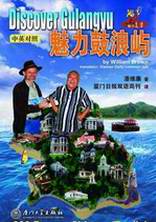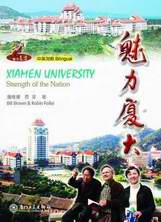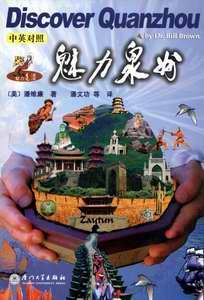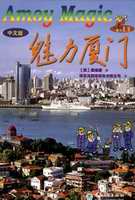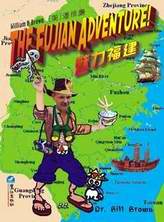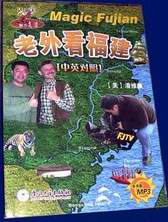![]() Click
to
Access
Click
to
Access
AMOY MAGIC SITE from
OUTSIDE China
![]() Click
to Access Amoy
Magic Site from
Click
to Access Amoy
Magic Site from
INSIDE
China ![]()
TRAVEL LINKS
![]() Xiamen
Xiamen
![]() Gulangyu
Gulangyu
![]() Jimei
Jimei
![]() Tong'an
Tong'an
![]() Jinmen
Jinmen
![]() Zhangzhou
Zhangzhou
![]() Quanzhou
Quanzhou
![]() Wuyi
Wuyi
![]() #1Fujian
Sites!
#1Fujian
Sites!
![]() Fujian
Foto Album
Fujian
Foto Album
![]() Books
on Fujian
Books
on Fujian
![]() Readers'Letters
Readers'Letters
![]() Ningde
Ningde
![]() Zhouning
Zhouning
![]() Longyan
Longyan
![]() Sanming
Sanming
![]() Putian
Putian
![]() Bridges
Bridges
![]() Travel
Info,
Travel
Info,
![]() Hakka
Roundhouses
Hakka
Roundhouses
![]() Travel
Agents
Travel
Agents
MISC. LINKS
![]() Amoy
People!
Amoy
People! ![]()
![]() Darwin
Driving
Darwin
Driving ![]()
![]() Amoy
Tigers
Amoy
Tigers
![]() Chinese
Inventions
Chinese
Inventions
![]() Tibet
in 80 Days
Tibet
in 80 Days![]()
![]() Amoy
Vampires!
Amoy
Vampires!
![]() Dethroned!
Dethroned!
![]()
![]() Misc.Writings
Misc.Writings
![]() Latest
News
Latest
News
![]() Lord
of Opium
Lord
of Opium
![]() Back
to Main Page
Back
to Main Page
![]() Order
Books
Order
Books![]() Xiamenguide
Forum
Xiamenguide
Forum
Note: Please click
thumbnails for larger photos
"The
China Story--Recollections of a Little Girl's Life in Amoy, China"
(1851-1859) Part 5
by Mary Augusta Doty Smith, Daughter of Elihu Doty, RCA Missionary to
China, 1844-1864
Part 1
Part 2
Part 3 Part 4
Part 5
Part 6
Elihu Doty Page
Amoy Mission
Ms.
Jean Watson, Secretary, New Jersey Postal History Society, and
author of "Doty's
Garden", providing this copy of Mary Augusta Doty Smith's (1851-1937)
fascinating 80-page account of her first eight years of life on Amoy.
(She is nicknamed "Pussie" in the story).
Mr. Elwood, Geiger,of South Dakota, a descendant of Elihu
Doty, kindly provided the Doty photos, and permission to use Mary Doty's
story. Mary J. Geiger was given a carbon copy, with handwritten
corrections and additions, and retyped it in Spring, 1972.
Obtain more Doty infofrom Reformed Church of America (RCA) archives at
www.rca.org
Continued from Part 4
[Amoy
Dictionary] The missionaries were eager to translate parts of
the Bible into their own language, and hymns for their services, and also
to complete a dictionary of their own dialect used in Amoy.
There are many dialects in the whole of China, no one of which is understood
by the rest of the people of the Empire. These workers also desired to
give their new church some literature too, as time went on. One Manual
of their dialect--bearing father's name as compilerˇŞis in our collection
of his Translations. There is also some work in this line in mother's
handwriting, which we have.
One or another of the missionaries, including the British ones, were busy
in the printing press room continually, in translating or compiling books
for the bookbinders; who I think must have been Chinese men of skill in
that line, as all the books and pamphlets are according to their workmanship,
and, of course, being for their use, begin at what we would call at the
end of the works!
I recall the pleasure, one time expressed, when some one brought a new
book in to show us allˇŞfinished at last, and so well and artistically
doneˇŞand the relief and joy over its accomplishment. The press room was
not at our home. Father's life was a busy one. He was a very methodical
man, and regularly went out after breakfastˇŞdressed, generally, in white
linen clothes and pith helmetˇŞso often used in the TropicsˇŞinto Chinese
homes, or for printing work, or in preaching or teaching, or to meet with
others in this work in earnest conversation and planning.
There were times when father and the others went on journeys into the
interior, and were away for several days. Two generally made the tours
together, and after the work was established, native elders accompanied
them. Travel by water was more desirable whenever possible, and the Mission
owned a sailboat and oars combined, which was used on these trips. Itineraries
required provisioning with bedding and food and medicine, as well as boxes
of books and leaflets to be distributed to members in established centers,
or to new ones who showed an interest in having them.
All our family were very glad when father returned; and there was much
eager and earnest conversation, which we children were too young to comprehend
further than to gather from tone of voice, the various degrees of joy
and hope, or disappointment, in their mission to these natives, many of
whom they had never seen before, or who had never heard a word of the
New Way of Life they had carried to them on these trips, which some received
thoughtfully and with questioning interest, and others quickly turned
from, with a shake of the headˇŞas is always the case.
[WomenˇŻs
Education] Father had a class of men he taught daily, who were
preparing to become preachers and teachers themselves, and pastors over
their own native churches, sometime. In that long ago day, there were
very few native churches or helpers: it was mainly a time of laying foundations.
Mother, too, had a class of women with whom she often met.
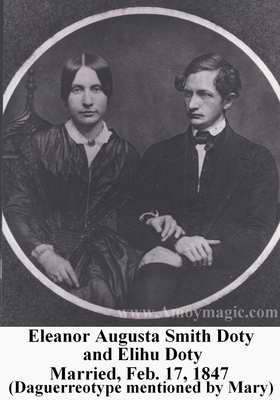 Just their status, I do not know. Of course they were not expected to
take part in services, or to be "Bible women", going out among
their sisters, at this early time. There were no schools for girls in
the Empire then, since their judgesˇŞthe menˇŞdeclared wonen could not learn;
they did not have brain power enough to do that; and to have schools for
them was foolishness. My impression is that mother did try to teach a
few women to read. They could commit to memory, more or less; that I know,
for I can hear them singing, even now, in their meetings with her. Still,
the echo carries, "Song tay chong cho te kop pwea", to the tune
of "Watchman, tell us of the night". I realize a native might
readily declare this is no language of his; butˇŞas near as six or less
years of age has it stored away in memory's cells,ˇŞand so quoted, with
apologies!
Just their status, I do not know. Of course they were not expected to
take part in services, or to be "Bible women", going out among
their sisters, at this early time. There were no schools for girls in
the Empire then, since their judgesˇŞthe menˇŞdeclared wonen could not learn;
they did not have brain power enough to do that; and to have schools for
them was foolishness. My impression is that mother did try to teach a
few women to read. They could commit to memory, more or less; that I know,
for I can hear them singing, even now, in their meetings with her. Still,
the echo carries, "Song tay chong cho te kop pwea", to the tune
of "Watchman, tell us of the night". I realize a native might
readily declare this is no language of his; butˇŞas near as six or less
years of age has it stored away in memory's cells,ˇŞand so quoted, with
apologies!
There were other hymns translated into their own language which were in
a book of hymns for their use. Among those translated, also they repeated
simple verses, and the Lord's Prayer.
These were the embryo, however, of the future days of faith and education,
when they all would be formed into a National Church, as we know is being
done in this, our day. Father's petition and hope to the Reformed Church,
was like seed sown to bear fruit after many days, in this process.
Late in our life in China, the new church was completed, very near the
home of Mr. Talmadge, and we children looked down from their upper verandah
upon the building, from the foundation work up to the finished church.
Then a day of dedication was set, which brought a large concourse of Chinese
friends and believers, men and women, and curious onlookers. We children,
from both families attended. The clean white walls and furnishing and
sweet odors stay with me still, and also the chatter of women and crying
of babies as their mothers tried to hush themˇŞall going on during the
services! But of the services we were too young to carry anything.
Mr. Talmadge's [Talmage; Mary persistently misspelled his name] and father's
warm friendship grew out of being the oldest of the missionaries in Amoy
in their day, and with many interests in common. Coming out on the same
ship made one of the close ties. And later, the kind and loving sharing
of the care of the Doty children after mother's death, is always to be
remembered warmly.
We were often at their home for longer or shorter visits, and once a man
from Micronesia came there and brought news of the mission work among
the "Islands of the Sea". He also brought breadfruit, as a curious
growth of that far off shore.
Mrs. Talmadge [Talmage] called us all about her, and gave us a piece,
and told us of its value as food, and pointed out its peculiar skin, and
so forth; and said, probably we would never see this kind of fruit again,
and should look well at it, so as to remember it. We anticipated a treat;
but it did not appeal to us, or make us regret we would never see the
like again! Nevertheless, now I have that bit of memory, which I would
not have had, but for "Auntie Talmsdge"'s impressing it upon
usˇŞof a product of a far off country.
[Rebuilding
the ˇ°Morning Starˇ±] This episode from "Micronesia"
brings another story. We were often told about the "Morning Star",
a little vessel which plied between the many islands of this group, to
serve the missionaries in one or another of them. Then came the account
of its being wrecked; and that the Sunday School children of America were
raising money to buy another boat to take its place. Charley and I were
very grieved over this loss, having had stories told to us of boys and
girls, natives, missing its help. We were asked if we would like to help
get some money, too, which of course, we were full of interest to do.
We were fitted out with a contribution sheet, and father took us to the
different offices of the Tea Merchants, and other foreign places, where
we placed before them the sad fact, and need of another boat, and asked
if they would help. They expressed great interest in our appeal, and towards
us children, and signed the paper and made offerings, until, when it was
time to return home we had received one hundred dollars for the new "Morning
Star". That very contribution paper is still in my possession! And
in an account written about the building of the second "Morning Star",
this story is incorporated with our namesˇŞa thrilling thing to two small
children, seven and five years old!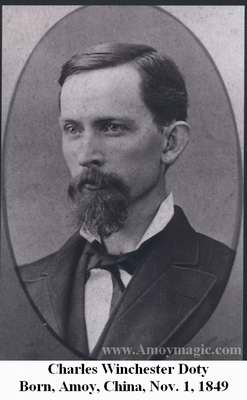
[Signal Hill;
Mail Ships] One daily service father gave his painstaking care
to recording, was the receiving of signals of shipping through flags and
colored balls, lowered and raised on a flagstaff , with known meanings
to the initiated, from a station far out in the harbor, seen only through
a spyglass.
Whenever a vessel or "Man of War" was turning into our waters,
great excitement followed, as the news was broadcast in our community.
Was it an American, British, Dutch, French, or East Indiaman? All carried
mail, which may have been months en route. And news of all kinds might
bee coming forward to meet friendsˇŞof joy or sorrow, distress or comfort.
So a deep suspense seemed to hover over all the company, some of whom
would gather at our house, as the place where first information could
be had, and also was situated nearest to the outer harbor. As the vessels
approached, first, the masts just rising above the horizon could be sighted
by the naked eye; then the sails and hulls; and by this tine, the spyglasses
could discern to what nationality the vessel belonged, and to what class
of ship.
If the "Stars and Stripes" flew at the stern, 0! the thrill
to our American family! If the cross of St. George was there, our warmest
friends were cheered; and all of the American Colony would be glad too,
for our interests were closely entwined, and our mails often, too, found
their way to us through the British ships.
Our American ships would bring the most direct letters to us, or boxes,
or perhaps a friendˇŞa missionaryˇŞto join forces with those who waited
to welcome them. If a British boat, an English or Scotch friend and his
wife might be returning again to China, after a visit to their homelands,
or new faces to add to their colony and make friends with all.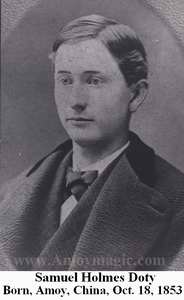
[Quarantine; First Childhood Sorrow] Trading vessels often went up and down the coast and dropped anchor, and officers came ashore, coming in to see us sometimes. In every case, as soon as the vessel had ridden into our harbor, and the anchor chains had rattled down, and with a mighty splash dropped into the deep, father and other men would be off in their rowboats to their sides, and on invitation, would climb up the rope ladder and give welcome. I expect there was some sort of quarantine, but it was quite lax, I am sure, for one trader on a return trip, whose wife and child accompanied the Captain, and who had visited us in our home and with the Talmadges in theirs, on more than one trip, came again, and we were very pleased to see Coco Mason, our little friend. But she became violently ill at the TalmadgesˇŻ home; and the next day it proved to be Asiatic cholera, and she died in a few hours. All the time until near the end, we children, who were so sorry for her sufferings, and wanted to be with her, were not prevented! None of us contracted the disease, however. This was our first childish sorrow.
[Childhood
Dramatics] As we grew older, Charley and I were taught
little poems and hymns which we sang with mother; and Bible verses and
stories became familiar to us. We received from the "London Missionary
Society" a caseˇŞunder glassˇŞabout eighteen by fifteen inches, of
colored pictures of Bible stories and scenes, from those of Adam and Eve,
through the Life of Jesus Christ, so were well acquainted with them.
We liked to play some of themˇŞthe Prodigal Son, in which Charley was the
old father and Sammy and I were the two sons. I, as the sinning one, asked
my portion of goods from the father and went off to a far countryˇŞway
to the end of our long verandah, which seemed very far sometimesˇŞand,
waiting there among the husks for a little, came slowly back, and was
met by the father, with outstretched arms, and really wept in my distress,
saying, "Father, I have sinned against Heaven and in thy sight",
and received the welcome home. It did not take much following of facts
to satisfy little children.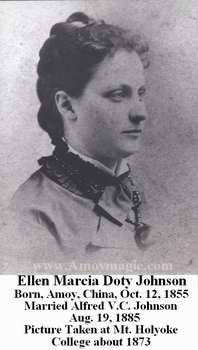
We dramatized the "Last Judgment". Charley was the Judge, perched
on the high back of a rattan chair, from which, he declared in a deep
voice, "Depart from me" or "Come ye blessed" to Sammy
and me, and baby "Mousie" who came along with us, and either
climbed up the big chair in answer to "Come ye blessed", or
turned in misery away as we "departed" to the far corner of
the verandah again, with a sense of guilty terror upon us!
We played the "Good Samaritan", and others. Sometimes the Talmadge
children were with us, and then there were angels, who flapped their wings
and skipped about in Joy, remembering and singing,ˇŞ
"I want to be an angel
And with the angels stand;
A crown upon ray forehead,
A harp within my hand. "
and,
"Around the
throne of God in Heaven,
Ten thousand children stand.
Children, whose sins are all forgiven,
A holy, happy band,
Singing glory, glory, glory
To our Lord Most High."
I expect that father and mother were often peeping at us from some hidden
spot, but I never remember we were stopped, as irreverent. It was a solemn
acting out of the stories, Oberammergau way, perhaps. Once Charley fell
from his height, and we were frightened over a broken arm, but after a
few days of wearing a pretty little wrapper which mother had made for
such emergencies, with a sleeve hanging armless, like a hero, it was quite
compensating!
My turn came next to wear it. Charley was cutting the string of a covered
basket of oranges or mandarins, and I leaned over his shoulder at just
the angle to catch the upstroke of his knife in my forehead, close up
to the hair line (where the scar still can be felt). Terror over the blood
that flew, and screams which brought both parents, and the bandaging and
comforting that went on, is very vivid still, and also the lying down
on the sofa with the pretty wrapper on as being quite satisfactory! This
same little garment is still kept in a trunk which came from Amoy,
with clothingˇŞfor "auld lang syne".
[Eating Mangoes]
A picture of mother comes to mind in connection with mangoes, which were
brought in. We loved them, and eagerly laid hands upon them, but were
stopped by her, as she quickly laid aside some occupation and said, "Don't
touch them until I can cover you all up".
We were enveloped in a sheet or large towel, and told not to get up from
our seats until all was eaten and Boa had brought water and washed our
faces back to the ears, and hands and arms, ˇ®most too roughly! Those
of you who know the fruit, appreciate the necessity for all this care,
as it is extremely juicy, and of a deep yellow stain, difficult to remove.
One or two other pictures of contacts with mother, which reveal her ways
of dealing with usˇŞor of my shares of itˇŞcome to mind. I think it takes
a personal touch upon little children to leave a lasting impressionˇŞprobably
I was five, approaching six. One day I found mother in the bath, or tub
room, with her long, dark hair thrown over her head and face, all covered
with soap lather, enjoying a good shampoo, given by herself, in a day
and place where professionals were unknown. But to me, it was a deed terrible
to behold, and my mother was being hurt! Of course, I screamed, which
brought father to the rescue, who took me in his arms, while mother opened
up the blinding hair and peeped through with a reassuring laugh, and soon
all was well again.
Another scene comes vividly to mind, which I will relate, lest the impression
is given that no natural occasions ever arose for severity. Mother called
me to her to try on a dress she was making; I protested that it hurt so,
and I didn't want to, butˇŞcame just the same. It was white material,
cross barred, made with baby waist gathered into a belt with short puffed
sleeves, and the material was reallyˇŞor felt to meˇŞstiff and scratchy.
I cried and squirmed and did all the naughty things which many another
little youngster has done, and will continue to do until time ends, I
suppose; and my mother was cross with me and talked severely to me, and
insisted on continuing her work, most hardheartedly! just as good mothers
always should do to naughty little girls, and big ones, too, who sometimes
behave just as badlyˇŞand be given plenary absolution for being cross!
Our parents were always interested in having us children see any sight
of note, and one night they awoke us, and brought us to the verandah to
see a ship on fire from stem to bow and topmast to water's edgeˇŞa thrilling
sight.
[Plans for
American Education; Mother & FriendˇŻs Death] About
this time, father and mother began to talk of going home to grandfather's
house, a year before mother died. We children were full of eagerness,
and Charley and I learned we older ones were to stay in America to receive
our educations. We pored over our children's books, which had pictures
in them of school houses and American girls and boys, who were wonderful
creatures to us, with their caps and coats, and girls with long curls
(my hair was short), or with bonnets tied under their chins, and long
pantalettes which came down to the tops of their shoes; and dreamed of
the time when we would look like them!
And always there was "our" flag floating over the school houses.
But complications came in the missionary work, and our parents were urged
to stay longer, which they did, with the end result we all know.
A loving attachment between one of the Scotch missionaries who came to
Amoy during the latter part of mother's life,
was that between the little girl nearly six, and Mr.
Sandeman. He always made a great pet of me, and I remember his teaching
me a Scotch hymn with the refrain, "0, How He loves", and he
and I used to sing it together, with other hymns too. Once he invited
me to spend the night with him, such a great event, and full of delight.
My nighty was put up for me to take, and he undreosed and put me in his
big bed, covered with a netting hung from the center of the ceiling to
the floor, (as all of our beds were likewise protected from insects).
In time, he took his place beside me, all so beautiful! Put it was a tropical
night, hot, and I rolled and tossed until he picked me up and carried
me to the latticed verandah, with the window thrown open, where the full
moon poured down upon us. Often this occasion and that brilliant moon,
comes to mind, when I gaze at full moons.
He talked to me, but it seems to have made no impression, and I guess
I curled up and went to sleep by his side, leaning up against him.
Shortly after mother's death, he died of cholera, leaving quite a heartache
with the little girl.
One of the events quite naturally impressing me very vividly, was my sixth
birthday, September, 1857, and mother died the next February, '58ˇŞso it
was the last in which she partook.
Mrs. Boyd invited me to spend the day with her, and on returning, I brought
with me presents: a beautiful doll with wax face and long curls, and a
white dress trimmed with pink silk fringe. Such a treasure! Besides this,
there was a toy set of blue and white china dishes, and a grey and blue
dress which came from England with the doll, all trimmed with ruffles
to the waist, and ribbons on the shoulders. Alas for my six years! It
was far too large, and beyond my age. Still, I looked with great joy at
it, and belief that I would soon be old enough to wear it! However, that
time never came until we were in America, and it looked pretty queer,
when at that time, no one wore ruffles. Still, I begged for it, feeling
very grand! My day was not over on returning with the lovely gifts. Mrs.
Syme, the Scotch lady, had sent me a choice work box of rosewood, with
inlaid mother of pearl decorations, and all full of Chinese carved ivory
sewing implements and other articles, cushioned on pink satin cases to
hold them; and a drawer when pulled out revealed a completely equipped
writing desk. I still keep it in my room, in evidence, though its physical
glories have to a great degree, vanished!
I had asked if I could have a party, consisting of my various gentlemen
friends and no one else! They sent formal notes, saying they would be
happy to come and asked me, or father or mother for me, to accept the
accompanying presents which their "boys", or servants, brought
with the notes. (Some of these notes I still have among my treasures.)
One gave me a whole piece of silk, blue and grey plaid, for a dress, which
was made for me when I went to Mount Holyoke. Another, silver dollarsˇŞcumshaw"
as he called itˇŞasking to have it applied as best desired for me. There
was a case of Chinese Puzzles of carved ivory. There were many of them,
but most of them have met the fate of children's vandalism, though a few
remain more or less intact.
There was a feather fan, decorated with Chinese painted flowers and birds
and butterflies, and ivory carvings made the framework. A lacquered jewel
case in fine workmanship came., and Is in good condition because mother
rescued it from being appropriated to dolls' uses, with the plea that
I would lend it to her for her bits of precious ware. I felt very magnanimous
and proud to be granting it to her, and she transferred her treasures
to the box, while I looked on and watched her make a silk pad for them
to rest on. They were always kept there through mother's life, and since
her death the box has never found other use, though the treasures have
been scattered in various ways.
There were other gifts, I am sure, but they have not, recorded themselves.
My party, aside from the beautiful gifts, leaves in my mind a happy occasion
with these young English and Scotch gentlemen, very attentive to me with
stories and games to my liking, and some good natured bantering over our
respective countries, which always seemed a satisfying thing to do, because
I always rose to the occasionˇŞ"bit", as we sayˇŞwhich was the
end desired!
Well! After such an exciting birthday, quite naturally, the next morning
mother found I was sick with quite a fever, and had to be petted and bathed
off in cool water, and kept on a light diet for several days. When better,
I again donned the little wrapper with satisfaction; and, best memory
of all, mother brought me squares of bread and guava jelly lumps, on each
piece, arranged around the edge of a pretty plate, with a mound of jelly
in the center, and fed them to me. O! Such a delightˇŞit was so good! This
is among the last memories of her in a personal way, for she died a few
months later, and other deeds are not so personal.
One thing which all of us shared must have originated with both parentsˇŞbread
and brown sugar served to us before we were dressed, every morning, while
father had his cup of coffee as a bracer against asthma, whose heavy breathing
and wheezing I remember, while we ate the bread and sugar and he drank
his coffee. Then old Boa helped us dress, and we went down to breakfast.
The son of the young boa, who carved nuts, waited on the table for us,
when required.
I have been looking over photos of friends in Amoy,
and seeing the face of Mrs. Lea, of the London Mission, brings to mind
that she taught me how to crochet, and form a pair of baby socks of grey
and canary yellow soft wool. This was probably during my fifth or sixth
year, and mother was still with us.
Soft wools came only from England at this tine. Yarns for use in knitting
or weaving was what practical young America needed, and made with her
spinning wheels, after sheep wools had been sheared and washed and carded
at the farmers' homes.
An English person whom I do not remember, learning of my new interest
in crocheting, gave me a quantity of beautiful colored soft worsteds,
preserved in a zinc can, against moths and worms. I was fascinated with
them, and pulled them about recklessly, snarling them up after the first
enthusiasm.
We had a young Chinese friend who supported herself embroidering with
silks and wools. These latter were very precious and hard to obtainˇŞChina
is the home of lovely silks, we know, but not of woolsˇŞso mother, very
sensibly, appealed to me for her work, and how much it would mean to her
in earning her living, if I would give her these. My heart was touched,
and I gladly did so, and felt rewarded, as even a little girl could see
how grateful she was.
One spectacle I remember distinctly, the last time or two that it passed
our house. It came annually, a Pageant of Chinese ships and boats, which
started up the Bay somewhere, and sailed, or were rowed past our house,
and far out beyond our sight, as a propitiation offered to their gods
to, secure protection and help from them during the coming year. The procession
was led by a new, small junk, beautifully finished, in carvings and paintings
in many bright colors, carrying a crew in gala attire, and with rings
flying from every vantage point. They sailed, or rowed by, each with its
crew and flags, with gongs, and drums and cymbals and reeds, such as we
associate with their known music. All went out seaward somewhere, and
there the beautiful little junk was burned, as an additional offering
to their god. Our hearts were much touched as we saw, annually, this spectacle,
and the dear little boat going outˇŞbut never coming back!
[Footbinding] We have all rejoiced over the promulgation in the
Chinese Republic, of the Law against further foot binding; the distresses
of which I caught sight of once, when wandering into old boa's rooms.
Young Boa had a daughter who came occasionally to see her, and have her
bound feet redressed; the unbinding of the long worn bandages, and bathing
of poor distorted feet where sores had developed, and then the distressing
binding up again, with moans and sobs from the young girl, and beating
from the mother as she shrank away from her, I looked upon.
This custom has not entirely been done away with, in the interior; but
was the universal care that was given all young girls and women of good
standing, with the same pitiful distresses, for generations.
Embroidering beautiful flowers and figures on "uppers" was one
of the accomplishments of Chinese ladies, younger or older, and then making
up the shoes, even stitching many layers of linen together into soles
to support the uppers. I used to watch young boa make tiny shoes in this
way for her child, and even attempted to make for my doll the same; but
evidently owned to myself it was too much to do; the many folds of linen
were so hard to push a needle through, up and down, and the silks tangled
up so!
Continue to Part 6 (Mother's Death, &
Return to America)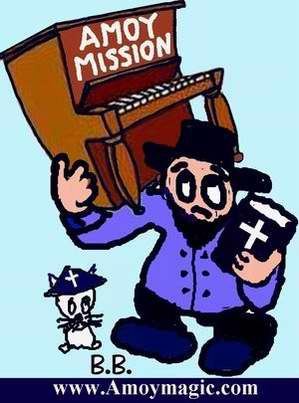
E-mail: amoybill@gmail.com
Snail Mail: Dr. William Brown
Box 1288 Xiamen University, Xiamen, Fujian
PRC 361005
TRAVEL
LINKS  Favorite
Fujian Sites
Favorite
Fujian Sites  Fujian
Foto Album
Fujian
Foto Album  Xiamen
Xiamen
 Gulangyu
Gulangyu
 Fujian
Guides
Fujian
Guides  Quanzhou
Quanzhou
 Zhangzhou
Zhangzhou
 Longyan
Longyan
 Wuyi
Mtn
Wuyi
Mtn  Ningde
Ningde
 Putian
Putian
 Sanming
Sanming
 Zhouning
Zhouning
 Taimu
Mtn.
Taimu
Mtn.  Roundhouses
Roundhouses
 Bridges
Bridges
 Jiangxi
Jiangxi
 Guilin
Guilin
 Order
Books
Order
Books Readers'
Letters New: Amoy
Vampires! Google
Search
Readers'
Letters New: Amoy
Vampires! Google
Search
Last Updated: October 2007
AMOY
MISSION LINKS
![]()
![]() A.M.
Main Menu
A.M.
Main Menu
![]() RCA
Miss'ry List
RCA
Miss'ry List
![]() AmoyMission-1877
AmoyMission-1877
![]() AmoyMission-1893
AmoyMission-1893
![]() Abeel,
David
Abeel,
David
![]() Beltman
Beltman
![]() Boot
Family
Boot
Family
![]() Broekema,
Ruth
Broekema,
Ruth
![]() Bruce,
Elizabeth
Bruce,
Elizabeth
![]() Burns,
Wm.
Burns,
Wm.
![]() Caldwells
Caldwells
![]() DePree
DePree
![]() Develder,
Wally
Develder,
Wally
![]() Wally's
Memoirs!
Wally's
Memoirs!
![]() Douglas,
Carstairs
Douglas,
Carstairs
![]() Doty,
Elihu
Doty,
Elihu
![]() Duryea,
Wm. Rankin
Duryea,
Wm. Rankin
![]() Esther,Joe
& Marion
Esther,Joe
& Marion
![]() Green,
Katherine
Green,
Katherine
![]() Hills,Jack
& Joann
Hills,Jack
& Joann
. ![]() Hill's
Photos.80+
Hill's
Photos.80+
..![]() Keith
H.
Keith
H.![]() Homeschool
Homeschool
![]() Hofstras
Hofstras
![]() Holkeboer,
Tena
Holkeboer,
Tena
![]() Holleman,
M.D.
Holleman,
M.D.
![]() Hope
Hospital
Hope
Hospital
![]() Johnston
Bio
Johnston
Bio
![]() Joralmans
Joralmans
![]() Karsen,
W&R
Karsen,
W&R
![]() Koeppes,
Edwin&Eliz.
Koeppes,
Edwin&Eliz.
![]() Kip,
Leonard W.
Kip,
Leonard W.
![]() Meer
Wm. Vander
Meer
Wm. Vander
![]() Morrison,
Margaret
Morrison,
Margaret
![]() Muilenbergs
Muilenbergs
![]() Neinhuis,
Jean
Neinhuis,
Jean
![]() Oltman,
M.D.
Oltman,
M.D.
![]() Ostrum,
Alvin
Ostrum,
Alvin
![]() Otte,M.D.
Otte,M.D.![]() Last
Days
Last
Days
![]() Platz,
Jessie
Platz,
Jessie
![]() Pohlman,
W. J.
Pohlman,
W. J.
![]() Poppen,
H.& D.
Poppen,
H.& D.
![]() Rapalje,
Daniel
Rapalje,
Daniel
![]() Renskers
Renskers
![]() Talmage,
J.V.N.
Talmage,
J.V.N.
![]() Talman,
Dr.
Talman,
Dr.
![]() Veenschotens
Veenschotens
. ![]() Henry
V.
Henry
V.![]() Stella
V.
Stella
V.
. ![]() Girard
V.
Girard
V.
![]() Veldman,
J.
Veldman,
J.
![]() Voskuil,
H & M
Voskuil,
H & M
![]() Walvoord
Walvoord
![]() Warnshuis,
A.L.
Warnshuis,
A.L.
![]() Zwemer,
Nellie
Zwemer,
Nellie
![]() Fuh-chau
Cemetery
Fuh-chau
Cemetery
![]() City
of Springs
City
of Springs
(Quanzhou, 1902!!)
![]() XM
Churches
XM
Churches ![]()
![]() Church
History
Church
History ![]()
![]() Opium
Wars
Opium
Wars
![]() A.M.
Bibliography
A.M.
Bibliography
![]() YMCA
Volunteer!
YMCA
Volunteer!
![]() XICF
Fellowship
XICF
Fellowship![]()
![]() Temples
Temples![]()
![]() Mosques
Mosques
![]() Christ
in Chinese
Christ
in Chinese
Artists'
Eyes
DAILY LINKS
![]() FAQs
Questions?
FAQs
Questions?
![]() Real
Estate
Real
Estate
![]() Shopping
Shopping
![]() Maps
Maps
![]() Bookstores
Bookstores
![]() Trains
Trains
![]() Busses
Busses
![]() Car
Rental
Car
Rental
![]() Hotels
Hotels
![]() News
(CT)
News
(CT)
![]() Medical
& Dental
Medical
& Dental
![]() Expat
Groups
Expat
Groups
![]() Maids
Maids
![]() Phone
#s
Phone
#s
EDUCATION
![]() Xiamen
University
Xiamen
University
![]() XIS(Int'l
School)
XIS(Int'l
School)
![]() Study
Mandarin
Study
Mandarin
![]() CSP(China
Studies)
CSP(China
Studies)
![]() Library
Library
![]() Museums
Museums
![]() History
History
DINING ![]() Tea
Houses
Tea
Houses
![]() Restaurants
Restaurants
![]() Asian
Asian
![]() Veggie
Veggie
![]() Junk
Food
Junk
Food
![]() Chinese
Chinese
![]() Italian
Italian
![]() International
International![]()
![]() Visas
4 aliens
Visas
4 aliens
RECREATION
![]() Massage!
Massage!
![]() Beaches
Beaches
![]() Fly
Kites
Fly
Kites
![]() Sports
Sports
![]() Boardwalk
Boardwalk
![]() Parks
Parks
![]() Pets
Pets
![]() Birdwatching
Birdwatching
![]() Kung
Fu
Kung
Fu ![]() Hiking
Hiking
![]() Music
Events
Music
Events
![]() Cinema
Cinema
![]() Festival&Culture
Festival&Culture
![]() Humor&
Humor&![]() Fun
Fotos
Fun
Fotos![]()
BUSINESS
![]() Doing
Business
Doing
Business
![]() Jobs!(teach/work)
Jobs!(teach/work)
![]() Hire
Workers
Hire
Workers
![]() Foreign
Companies
Foreign
Companies
![]() CIFIT
(Trade Fair)
CIFIT
(Trade Fair)
![]() MTS(Translation)
MTS(Translation)
![]()
Back to Top
